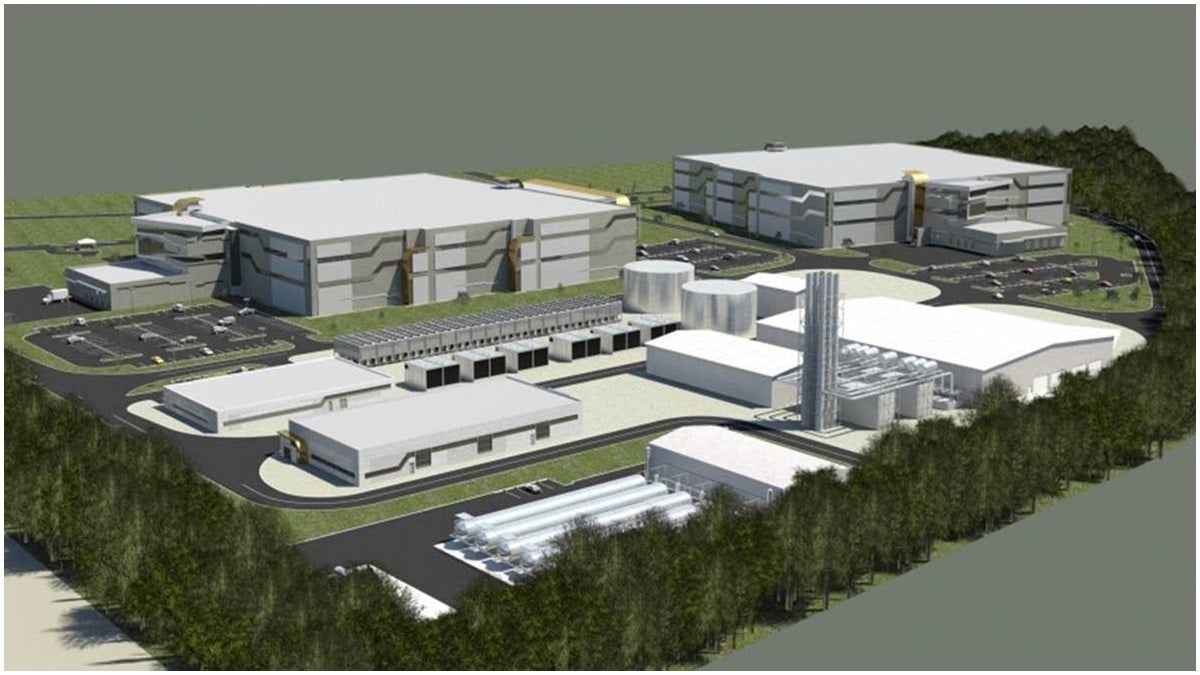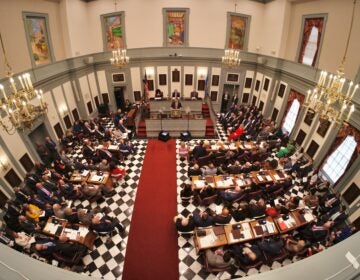Reaction to UD’s ‘clean break’ from The Data Centers
Listen
Rendering of proposed data center and CHP (Photo courtesy of TDC)
After 399 days of fighting, dozens of Newark residents are celebrating now that the University of Delaware has killed its lease with The Data Centers, LLC.
The decision was based on a summary report released by a group of appointed members from UD’s faculty and administration that concluded TDC’s proposed data center and 279-megawatt combined heat and power plant “is not consistent with a first class science and technology campus and high quality development to which UD is committed.”
The university made the announcement Thursday morning.
Gene Kern, president of The Data Centers, LLC, expressed his disappointment with the university’s decision and issued the following statement:
“TDC disagrees that the University can terminate its ground lease for the reasons stated. We are evaluating TDC’s options. TDC remains committed to developing a first-class data center within the State of Delaware.”
The grassroots campaign against the power plant consisted of about 270 members trying to prevent the construction of a natural gas-fired combined heat and power plant on the University of Delaware’s STAR campus.
“The biggest surprise to us is the clean break,” said Jen Wallace, a member of Newark Residents Against the Power Plant. “We thought it was a possibility the university could come out with a decision that was ambiguous to us, something like, ‘Okay, the power plant can be smaller,’ and certainly that would not have been as big of a win in our eyes.”
Chief among NRAPP’s concerns was the environmental impact of building a power plant so close to homes in the college town. As the controversy snowballed, the university formed a working group to review TDC’s plans.
TDC argued that it needed a 279-megawatt cogeneration plant to run its proposed data center, creating the first-of-its-kind, stand-alone internet facility in the country. Instead of accessing fluctuating electricty from the grid, TDC officials said generating their own power would create a consistent and more reliable source of power.
NRAPP, however, maintained that TDC’s reason for building such a large power plant was to generate excess power for resale.
“The overwhelming, damning piece of evidence is that TDC’s main argument was reliability,” Wallace said. “The University of Delaware’s investigation shows that, well, the grid is actually more reliable. So that raises the question, ‘Well, why, why do you need a power plant if the grid is actually going to provide you with the reliability that is the basis for the business plan?'”
UD faculty and administrators appointed to the working group also wrote in their report that, because TDC’s plans have not been finalized and remain subject to change, a “detailed evaluation of most environmental impacts was not possible.”
“I’m glad that the university stepped back, took a deep breath,” said Rep. John Kowalko, D-Newark South. “If they built a data center on that property and tied it to existing energy lines, I think that would be appropriate.”
Wallace, along with other members of NRAPP, feels vindicated.
“There are too many unknown variables that I think [UD] recognized it’s probably not a good fit, it’s too big of a risk for them to take considering their commitment to reducing their carbon footprint on their campus,” she said. “This project is not a good idea for our backyard, but it’s also not a good idea for anyone’s backyard.”
WHYY is your source for fact-based, in-depth journalism and information. As a nonprofit organization, we rely on financial support from readers like you. Please give today.





